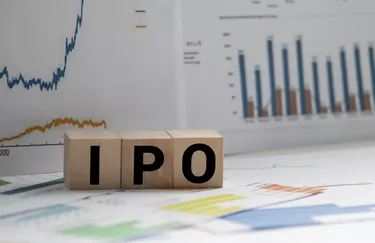
Some initial public offerings (IPOs) create a lot of excitement and seem to offer the possibility of making a lot of money. Unfortunately, that's not always what happens.
Remember the Facebook IPO in May 2012? It came out at $38 per share and immediately dropped to $18 and didn't reach the $38 offering price until August 2013, over a year later. Today, Facebook stock trades for more than $300 per share. But it was a wild ride at first.
Video of the Day
Video of the Day
Some IPOs are profitable from the start, while others drift downward and never make a profit. That's the risk you take when you buy an IPO.
Consider also: Investing Through Your 50s
What Is an IPO?
An IPO is when a company sells its shares of capital stock to the public for the first time. Companies use IPOs to raise money to expand the business, pay off debt or for the existing owners to cash out their shares. More than 57 percent of the shares of Facebook's IPO were sold to insiders cashing out. Not exactly a vote of confidence.
A lead investment bank or underwriter forms a syndicate of brokerage firms to distribute the new shares to its clients. After the IPO, the company becomes a new public company with its stock traded on an exchange, like the NYSE or NASDAQ.
Consider also: Investing in Stocks for Beginners: Introduction & Best Investment Apps for Beginners
What Is a Prospectus?
Companies planning to have an IPO must file a registration statement that contains a prospectus with the U.S. Securities and Exchange Commission (SEC). The prospectus will discuss the risk factors involved with the offering, the intended use of proceeds, the number of shares being offered, the company's dividend and management's discussion and an analysis of the company's financial conditions and results of its operations.
The prospectus will also have information about the number of shares being sold by the existing shareholders and the number of shares, known as the market overhang, that will be hitting the market after the restricted period ends.
Some IPOs are profitable from the start, while others drift downward and never make a profit. That's the risk you take when you buy an IPO.
Pricing the Offering
The underwriter analyzes the company's financial condition, determines the number of shares to sell and gauges the public enthusiasm for the IPO. The goal is to raise the most money at the highest share price. There's no guarantee that the offering price is fair.
If the public believes that the share price is too high, the price will drop immediately after the opening, as was the case with Facebook's IPO.
Consider also: What Happens to Stock Price When a Public Company Goes Private?
Investing in an IPO
The opportunity to buy stock in an IPO isn't available to everyone. The brokerage firms handling the distribution receive an allotment from the lead underwriter of a certain number of shares. These brokers then offer the shares to their preferred customers, typically institutions and those clients with substantial accounts.
If you don't have a strong relationship with a participating broker, you'll likely not be able to purchase any initial shares of an IPO.
Consider also: Definition of a Securities Brokerage
What Else to Consider
Nobody knows for sure which way a stock price will go after the IPO. Price movements can be volatile in the first few months. A good rule of thumb is that you should never invest in an IPO, assuming you even have the chance, with money you can't afford to lose.
There's no guarantee that the price of an IPO is fair. Companies that go public with an IPO often have limited operating histories, maybe only a few years, which makes predicting their future success challenging.
If you're interested in learning more about the IPO of a specific company, you should check with the SEC's Office of Consumer Education and Advocacy and see if they have issued an Investor Bulletin with information about the company's and its IPO.